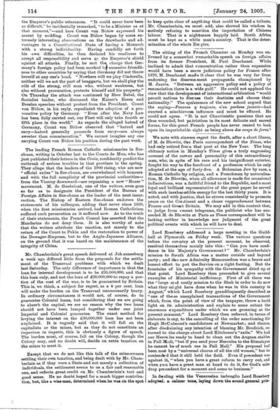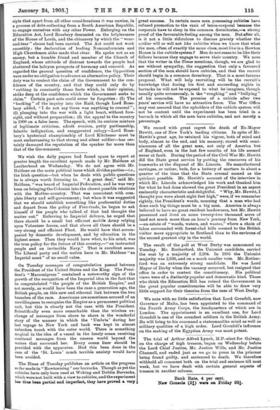ciple that apart from all other considerations it was unwise,
in a process of debt-collecting from a South American Republic, to engage ourselves with any other Power. Enlarging on the Education Act, Lord Rosebery descanted on the helplessness of the House of Lords, and the chicanery by which the " wear- and-tear " clause had been carried. The Act could not work smoothly : the declaration of leading Nonconformists and High Churchmen alike made that clear. He spoke not as an enemy, but a humble friend and member of the Church of England, whose attitude of distrust towards the people had shattered the halcyon prospects of harmony and concord. As regarded the general question of confidence, the Opposition were under no obligation toadvance an alternative policy. Their duty was to contest the claim of the Government to the con- fidence of the country, and that they could only do by " rubbing in constantly those facts which, in their opinion, strike deep at the confidence which the Government seeks to claim." Certain past acts could never be forgotten : (1) The " burking " of the inquiry into the Raid, though Lord Rose- bery added, " I do not say there was anything to conceal "; (2) plunging into the war with a light heart, without fore- sight, and without preparation ; (3) the appeal to the country in 1900 on a false issue. The speech, with its curious mixture of legitimate criticism, adroit evasion, petty partisanship, falsetto indignation, and exaggerated eulogy—Lord Rose- bery's hysterical championship of Lord Kitchener must be most embarrassing to that strong and silent soldier—has cer- tainly damaged the reputation of the speaker far more than that of the Government.







































 Previous page
Previous page